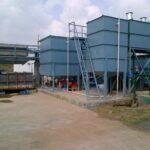Notifications

5 minutes, 26 seconds
-205 Views 0 Comments 0 Likes 0 Reviews

As Pune continues to emerge as one of India’s fastest-growing industrial hubs, sustainability has taken center stage in discussions about its future development. From automobile manufacturing to pharmaceuticals and IT parks, the city's rapid industrialization brings with it a pressing challenge — managing industrial wastewater responsibly. This is where Effluent Treatment Plants (ETPs) play a vital role.
ETPs are not just compliance tools anymore; they have become crucial drivers of sustainable industrial development. This article explores how ETPs are helping industries in Pune move toward environmentally responsible growth while balancing production and ecological preservation.
Effluent Treatment Plants are specialized facilities designed to treat and manage wastewater generated by industrial activities. This wastewater may contain chemicals, heavy metals, oils, dyes, and harmful biological contaminants that can severely affect the environment if left untreated.
An ETP uses a combination of physical, chemical, and biological processes to remove pollutants, ensuring that the treated water meets the environmental discharge standards set by the Maharashtra Pollution Control Board (MPCB) and Central Pollution Control Board (CPCB).
Pune is home to thousands of manufacturing units and special economic zones (SEZs). As production increases, so does the quantity of effluent. ETPs are essential to treat this wastewater efficiently and prevent pollution of rivers like Mula and Mutha.
Industrial units in Pune are required to adhere to strict environmental norms. Non-compliance can lead to heavy penalties, shutdowns, or loss of reputation. ETPs help industries remain compliant with environmental laws while showcasing their commitment to sustainability.
Water scarcity is a growing concern in Pune, especially during dry seasons. ETPs enable industries to recycle and reuse treated wastewater for non-potable applications like cooling, cleaning, or landscaping, significantly reducing freshwater dependency.
Improper disposal of untreated industrial effluent can seep into groundwater, posing long-term health risks. By effectively treating waste, ETPs act as the first line of defense against underground water pollution.
ETPs help in preserving natural water bodies by preventing toxic discharges. This maintains aquatic biodiversity and safeguards local ecosystems.
Many modern ETPs are integrated with Zero Liquid Discharge (ZLD) systems, where every drop of wastewater is treated and reused — minimizing waste and promoting resource efficiency.
With advancements in technology, ETPs are now more energy-efficient, using smart automation and biological treatments that reduce overall energy consumption while maintaining treatment effectiveness.
Industries with functional ETPs enhance their brand reputation and demonstrate commitment to Corporate Social Responsibility (CSR) and Environmental, Social, and Governance (ESG) goals.
Several industrial clusters around Pune — such as Chakan, Ranjangaon, and Hinjawadi — have adopted centralized ETPs or in-house systems with impressive results. For example:
Pharmaceutical companies in Ranjangaon have achieved ZLD using advanced ETPs.
Auto manufacturers in Chakan recycle up to 80% of their wastewater.
IT campuses in Hinjawadi use treated water from ETPs for landscaping and HVAC systems.
These examples highlight how Effluent treatment plant in Pune are not just functional necessities but strategic assets in long-term sustainable growth.
Despite the benefits, some challenges remain:
High setup and operational costs
Need for skilled manpower
Regular maintenance and monitoring
Resistance from smaller units due to lack of awareness
To address these, the government and environmental bodies can:
Offer subsidies and incentives for ETP installation
Promote cluster-based ETPs for small industries
Encourage public-private partnerships for sustainable water management
Effluent Treatment Plants are foundational to sustainable industrial development in Pune. They help industries meet environmental regulations, reduce water consumption, and contribute to a cleaner, greener city. As the demand for sustainable practices grows globally, Pune’s industries must continue investing in modern ETP systems to remain competitive, responsible, and future-ready.

